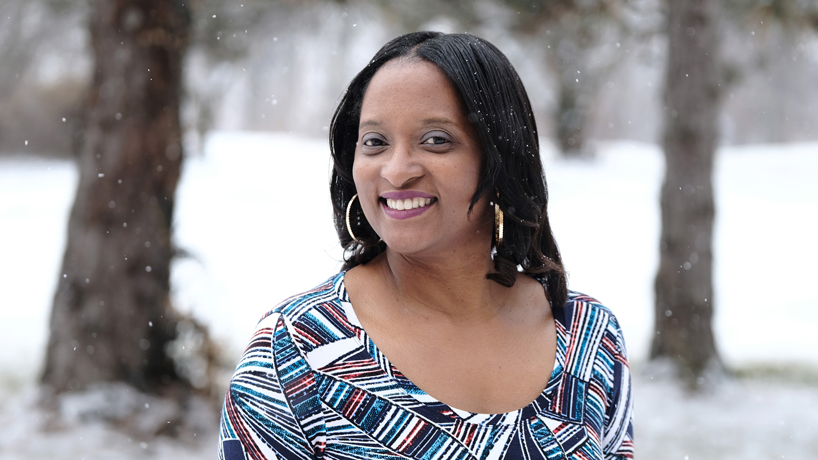
Growing up in Arkansas, Sharon Johnson’s experience in a low-income, Mississippi River Delta town spurred her career in social work. Last August she was named dean of the UMSL School of Social Work. (Photo by August Jennewein)
Sharon Johnson wasn’t born to be a social worker, but her experiences growing up in Marianna, Arkansas, certainly contributed greatly to her choosing it as her life’s work.
A sleepy Mississippi River Delta town of about 4,200 people today (8,000 in Johnson’s time) and about an hour southwest of Memphis, Tennessee, Marianna is mostly African American and low-income. It’s not a place ripe with economic and social opportunities.
“I thought about engineering,” Johnson said of her educational and career options. “But deep down I really wanted to help people. I saw what I thought were some injustices [growing up].”
Johnson decided that social work and the “diversity of experiences the field offers” was the best route for her. After graduating from high school, she left Marianna for the University of Arkansas at Fayetteville.
Upon receiving her bachelor’s degree in 1989, Johnson married and moved to Burlington, Vermont, and later to Worchester, Massachusetts, where her husband, Marvin, worked for Digital Equipment Corp. Johnson met her husband at UA, where, ironically, he majored in engineering.
Johnson worked in Massachusetts with adults with development delays, but ultimately the couple decided they just didn’t fit the Eastern lifestyle.
“We wanted to live closer to home – not home – but closer to home,” Johnson said, picking St. Louis over several other Midwest and Mid-South options. The Johnsons set up residence in Florissant, Missouri, and remain there today.
Marvin retained his position with DEC when the couple came here. Johnson worked at several agencies – including the state Public Defender’s Office – while pursing master’s and doctoral degrees in social work at Washington University in St. Louis.
“I received my master’s degree and then thought about law school,” Johnson said. “But I chose the PhD in social work. I wasn’t sure [then] what this academic thing was, but it’s worked out well. I really enjoy the challenge.”
“Worked out well” is probably an understatement. Johnson joined the University of Missouri–St. Louis social work faculty in 1999 and steadily moved toward tenure and a full professorship. In August 2016, Johnson was named dean of the UMSL School of Social Work. She succeeded the school’s founding dean, Lois Pierce, who decided to return to her faculty position.
“Lois was instrumental in establishing the master’s program and transitioning social work from a department in the College of Arts and Sciences to a full-fledged autonomous school,” Johnson said. “I’ve learned so much from Lois.”
Six months into her new position, Johnson said she’s still learning. She’s also working to continue the school’s momentum.
The school enrolls about 500 students, who learn from top-notch research faculty and gain experience at agencies and organizations throughout the region while attending UMSL. Johnson said the practical nature of the program is a unique niche.
“This is definitely a strength for our students and local agencies,” Johnson said. “Many of our students come to us being employed simultaneously in these agencies. So they are able to bring their experiences to the classroom and share them with other students who have possibly not worked in social services before. Local agencies in turn benefit from the developed network students gain while here and the networks lead to easier facilitation of shared services, referrals and collaborations.”
It also leads to job offers.
“There are probably very few social service agencies in St. Louis without an UMSL BSW or MSW graduate,” Johnson said. “Currently PROMO, Saint Louis Mental Health Board, YMCA, Division of Family Services, St. Louis County Court, Federal Probation and Parole and Special School District are just a few places you will find students with either a BSW and/or MSW from UMSL.”
Johnson’s challenge will be finding ways to expand those opportunities and adding quality faculty to service increased enrollments – which would be good for the school and the region.
“Our students are committed to this region, and they are impacting lives in positive ways,” Johnson said. “They are raising their families here, contributing to the local economy and advocating for the rights of all individuals on many levels. This is important for the continued growth and sustainability of the region.”
Creating economic and social opportunities is important. Johnson learned that growing up in Marianna. Today, St. Louis is benefiting from those lessons.















